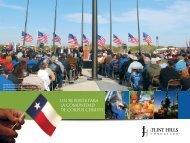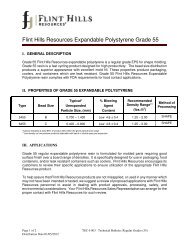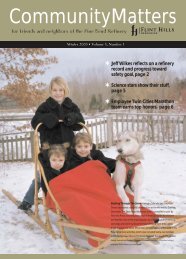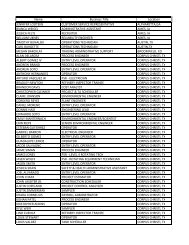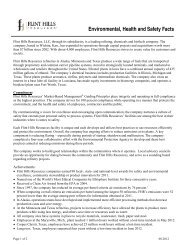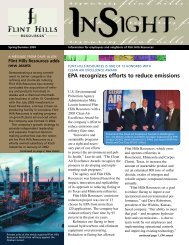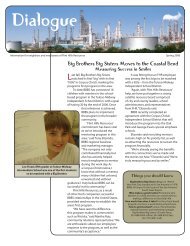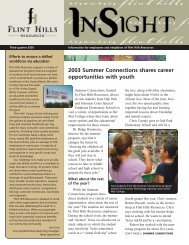Front Page -- fhr - Flint Hills Resources
Front Page -- fhr - Flint Hills Resources
Front Page -- fhr - Flint Hills Resources
Create successful ePaper yourself
Turn your PDF publications into a flip-book with our unique Google optimized e-Paper software.
Environmental, Health and Safety Facts<strong>Flint</strong> <strong>Hills</strong> <strong>Resources</strong>, LLC, through its subsidiaries, is a leading refining and chemicals company. The company, basedin Wichita, Kan., has expanded its operations through capital projects and acquisitions worth more than $4.6 billionsince 2002. With about 3,500 employees, <strong>Flint</strong> <strong>Hills</strong> <strong>Resources</strong> strives to create value for customers and society.<strong>Flint</strong> <strong>Hills</strong> <strong>Resources</strong>’ refineries in Alaska (North Pole), Minnesota (Rosemount) and Texas (Corpus Christi) produce awide range of fuels that are transported through proprietary and common carrier pipeline systems, stored in a vastsystem of strategically located terminals, and marketed to wholesalers and retailers throughout the United States.The company’s chemicals business, with plants in Illinois (Joliet and Peru), Michigan (Marysville) and Texas(Longview and Port Arthur) produce aromatics, olefins, polymers and intermediate chemicals. The company alsoproduces and markets asphalt in the Midwest and Alaska and owns an interest in a base oil facility in Louisiana.Commitment<strong>Flint</strong> <strong>Hills</strong> <strong>Resources</strong>’ MBM ® Guiding Principles place integrity and operating in full compliance as the highestpriorities. The company strives for 100 percent compliance while operating in a manner that protects the environment,and the health and safety of employees, contractors and the public.By communicating a vision for excellence and encouraging open communication, the company nurtures a culture ofsafety that extends past personal safety to process systems. <strong>Flint</strong> <strong>Hills</strong> <strong>Resources</strong>’ facilities are among the best in theirindustries when it comes to safety.Each <strong>Flint</strong> <strong>Hills</strong> <strong>Resources</strong> facility is unique and each develops and utilizes best practices to use resources efficientlyand protect the environment. Overall, the company has ongoing efforts to reduce emissions at its plants. A keycomponent is reducing flaring – especially during periods of startup, shutdown and malfunction. The companycompleted a four-year collaborative effort with the U.S. Environmental Protection Agency to develop and share bestpractices aimed at reducing emissions during these periods.The company works to build good relationships within the communities where its operations are located. Localadvisory councils provide an opportunity for dialog between the community and <strong>Flint</strong> <strong>Hills</strong> <strong>Resources</strong> and serve as asounding board regarding refinery projects.Achievements:• In 2008, the company’s overall refinery operations criteria air emissions per barrel were 60 percent lower than theaverage among peer refiners (based on latest comparison data available).• Since 1997, the company has reduced its average per-barrel criteria air emissions by 71 percent.• In Alaska, operations teams have developed and implemented more efficient processing methods that decreaseproduction costs and save energy.• At the Minnesota and Texas refineries, projects to increase efficiency have allowed the plants to produce moreproducts while using less energy, and others save time or resources such as water.• A water recycling program at the Minnesota refinery allows it to recover and re-use wastewater discharged from theplant. The refinery earned the Waste Water Operator Award from the Minnesota Pollution Control Agency for itswater use program.• All company sites have systems in place to recycle materials, wastewater, trash, paper and steel.• Since 2001, <strong>Flint</strong> <strong>Hills</strong> <strong>Resources</strong> facilities have earned 58 safety awards from the National Petrochemical &Refiners Association, including the Distinguished Safety Award.• In 2008, refinery employees reached safety milestones for hours worked without an incident or injury resulting intime away from work: Alaska, 1.5 million hours; Minnesota, 4.3 million hours; and Texas, eight years.• The company has ten STAR sites in state or federal safety agency’s Voluntary Protection Programs: Fort Worth,Austin, San Antonio, Waco, Corpus Christi West and East plants, Longview and Port Arthur, Texas; Rosemount,<strong>Page</strong> 1 of 2 05-2009
Minn. and Peru, Ill. The company’s four fuel terminals in Texas were the first in their industry to achieve thisdesignation. The Minnesota refinery has been MNSTAR certified since 2005. Certification is given by theMinnesota Department of Labor and Industry.• The company’s terminal operations in five states earned the Platinum Safety Award from the International LiquidTerminals Association. The terminals group completed 2008 and 2007 with no OSHA recordable or lost-timeincidents.• Since 2001, the Minnesota refinery has earned several Minnesota Safety Council’s Governor’s Awards including theOutstanding Achievement Award and the Award of Honor, its highest honor.• Wildlife management programs at the Joliet, Ill., Rosemount, Minn., and Corpus Christi, Texas, sites have receivedWildlife Habitat Council certification. Both the Joliet and Corpus Christi sites have also received Corporate Landsfor Learning certification from WHC.LeadershipBrad Razook, president & CEOContactMarc Palazzo, vice president, public affairsPhone: 316-828-7462For more information, visit www.<strong>fhr</strong>.com<strong>Page</strong> 2 of 2 05-2009



